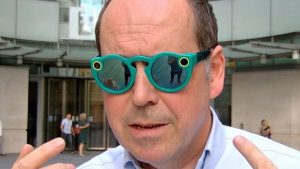The new spectacles are an evolution from that idea, letting lens creators project their creations onto the world around them. Previous versions of Spectacles were focused on cameras for capturing content - the AR display is new to this latest release.
Examples which the company showcased included a digital projection of neon sea creatures on a real-world beach, an art gallery projected onto the street, and a guided tour with enhanced visuals of a landscape.

On the inside, the new tech has two cameras, four microphones and stereo speakers, and is powered by a chip specifically tuned for AR and VR. But it only has a 30-minute battery life.
For now, they remain available only upon application by creators of Snapchat lenses, using the company's Lens Studio desktop software, a tool for creating 3D-modelled AR experiences.
That strategy of limited release is not new.
The first version of Spectacles was released by Snap Inc, the company behind Snapchat, through limited pop-up vending machines which helped create a marketing buzz around the idea.
It later sold them as a regular product online - but after a year, the first version had hit Snap Inc's finances to the tune of $40m (£30m). That led to comparisons to Google's failed "smart glasses" experiment, Google Glass.

That did not stop Snap Inc - which calls itself a camera company - from sticking with the project. The latest AR innovation is the fourth version of Spectacles.
"Spectacles are the next step in Snap's journey to reinvent the camera," the company said in a press release.
"The new Spectacles bring imagination to life in a natural way—with our eyes looking out at the world in front of us."
Snapchat does not receive the same level of attention as other social media networks such as Facebook or Twitter, but it remains hugely popular. The company now reports that it has 500 million monthly active users.
Leo Gebbie, an analyst with CCS Insight, said the new spectacles were "ambitious".
"The Spectacles represent a staging post on the gradual journey to smartglasses, even if the decision to restrict their availability shows that they aren't consumer-ready just yet," he said.
AR devices are getting "slimmer, lighter and more powerful", he said.
"However, we're still years away from the 'holy grail' of a device which looks no different from normal eyewear, and there are lots of challenges to be overcome in device engineering and design."
While still not ready for general sale, "it should spur the development of innovative and exciting new uses," he added.








